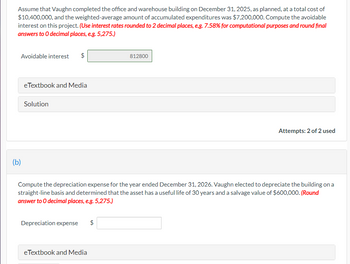Vaughn Furniture Company started construction of a combination office and warehouse building for its own use at an estimated cost of $10,000,000 on January 1, 2025. Vaughn expected to complete the building by December 31, 2025. Vaughn has the following debt obligations outstanding during the construction period. Construction loan-12% interest, payable semiannually, issued December 31, 2024 Short-term loan-10% interest, payable monthly, and principal payable at maturity on May 30, 2026 Long-term loan-11% interest, payable on January 1 of each year; principal payable on January 1, 2029 (a) Avoidable interest $4,000,000 3,000,000 Assume that Vaughn completed the office and warehouse building on December 31, 2025, as planned, at a total cost of $10,400,000, and the weighted-average amount of accumulated expenditures was $7,200,000. Compute the avoidable interest on this project. (Use interest rates rounded to 2 decimal places, e.g. 7.58% for computational purposes and round final answers to O decimal places, e.g. 5,275.) $ 2,000,000
Vaughn Furniture Company started construction of a combination office and warehouse building for its own use at an estimated cost of $10,000,000 on January 1, 2025. Vaughn expected to complete the building by December 31, 2025. Vaughn has the following debt obligations outstanding during the construction period. Construction loan-12% interest, payable semiannually, issued December 31, 2024 Short-term loan-10% interest, payable monthly, and principal payable at maturity on May 30, 2026 Long-term loan-11% interest, payable on January 1 of each year; principal payable on January 1, 2029 (a) Avoidable interest $4,000,000 3,000,000 Assume that Vaughn completed the office and warehouse building on December 31, 2025, as planned, at a total cost of $10,400,000, and the weighted-average amount of accumulated expenditures was $7,200,000. Compute the avoidable interest on this project. (Use interest rates rounded to 2 decimal places, e.g. 7.58% for computational purposes and round final answers to O decimal places, e.g. 5,275.) $ 2,000,000
Chapter1: Financial Statements And Business Decisions
Section: Chapter Questions
Problem 1Q
Related questions
Question

Transcribed Image Text:Vaughn Furniture Company started construction of a combination office and warehouse building for its own use at an
estimated cost of $10,000,000 on January 1, 2025. Vaughn expected to complete the building by December 31, 2025. Vaughn
has the following debt obligations outstanding during the construction period.
Construction loan-12% interest, payable semiannually, issued December 31, 2024
Short-term loan-10% interest, payable monthly, and principal payable at maturity on May 30, 2026
Long-term loan-11% interest, payable on January 1 of each year; principal payable on January 1, 2029
(a)
Assume that Vaughn completed the office and warehouse building on December 31, 2025, as planned, at a total cost of
$10,400,000, and the weighted-average amount of accumulated expenditures was $7,200,000. Compute the avoidable
interest on this project. (Use interest rates rounded to 2 decimal places, e.g. 7.58% for computational purposes and round final
answers to O decimal places, e.g. 5,275.)
Avoidable interest
$4,000,000
3,000,000
2,000,000
$
Expert Solution
This question has been solved!
Explore an expertly crafted, step-by-step solution for a thorough understanding of key concepts.
This is a popular solution!
Trending now
This is a popular solution!
Step by step
Solved in 3 steps

Follow-up Questions
Read through expert solutions to related follow-up questions below.
Follow-up Question

Transcribed Image Text:Assume that Vaughn completed the office and warehouse building on December 31, 2025, as planned, at a total cost of
$10,400,000, and the weighted-average amount of accumulated expenditures was $7,200,000. Compute the avoidable
interest on this project. (Use interest rates rounded to 2 decimal places, e.g. 7.58% for computational purposes and round final
answers to O decimal places, e.g. 5,275.)
Avoidable interest
(b)
$
LA
Solution
eTextbook and Media
Depreciation expense $
Compute the depreciation expense for the year ended December 31, 2026. Vaughn elected to depreciate the building on a
straight-line basis and determined that the asset has a useful life of 30 years and a salvage value of $600,000. (Round
answer to O decimal places, e.g. 5,275.)
eTextbook and Media
812800
CA
Attempts: 2 of 2 used
Solution
Knowledge Booster
Learn more about
Need a deep-dive on the concept behind this application? Look no further. Learn more about this topic, accounting and related others by exploring similar questions and additional content below.Recommended textbooks for you


Accounting
Accounting
ISBN:
9781337272094
Author:
WARREN, Carl S., Reeve, James M., Duchac, Jonathan E.
Publisher:
Cengage Learning,

Accounting Information Systems
Accounting
ISBN:
9781337619202
Author:
Hall, James A.
Publisher:
Cengage Learning,


Accounting
Accounting
ISBN:
9781337272094
Author:
WARREN, Carl S., Reeve, James M., Duchac, Jonathan E.
Publisher:
Cengage Learning,

Accounting Information Systems
Accounting
ISBN:
9781337619202
Author:
Hall, James A.
Publisher:
Cengage Learning,

Horngren's Cost Accounting: A Managerial Emphasis…
Accounting
ISBN:
9780134475585
Author:
Srikant M. Datar, Madhav V. Rajan
Publisher:
PEARSON

Intermediate Accounting
Accounting
ISBN:
9781259722660
Author:
J. David Spiceland, Mark W. Nelson, Wayne M Thomas
Publisher:
McGraw-Hill Education

Financial and Managerial Accounting
Accounting
ISBN:
9781259726705
Author:
John J Wild, Ken W. Shaw, Barbara Chiappetta Fundamental Accounting Principles
Publisher:
McGraw-Hill Education